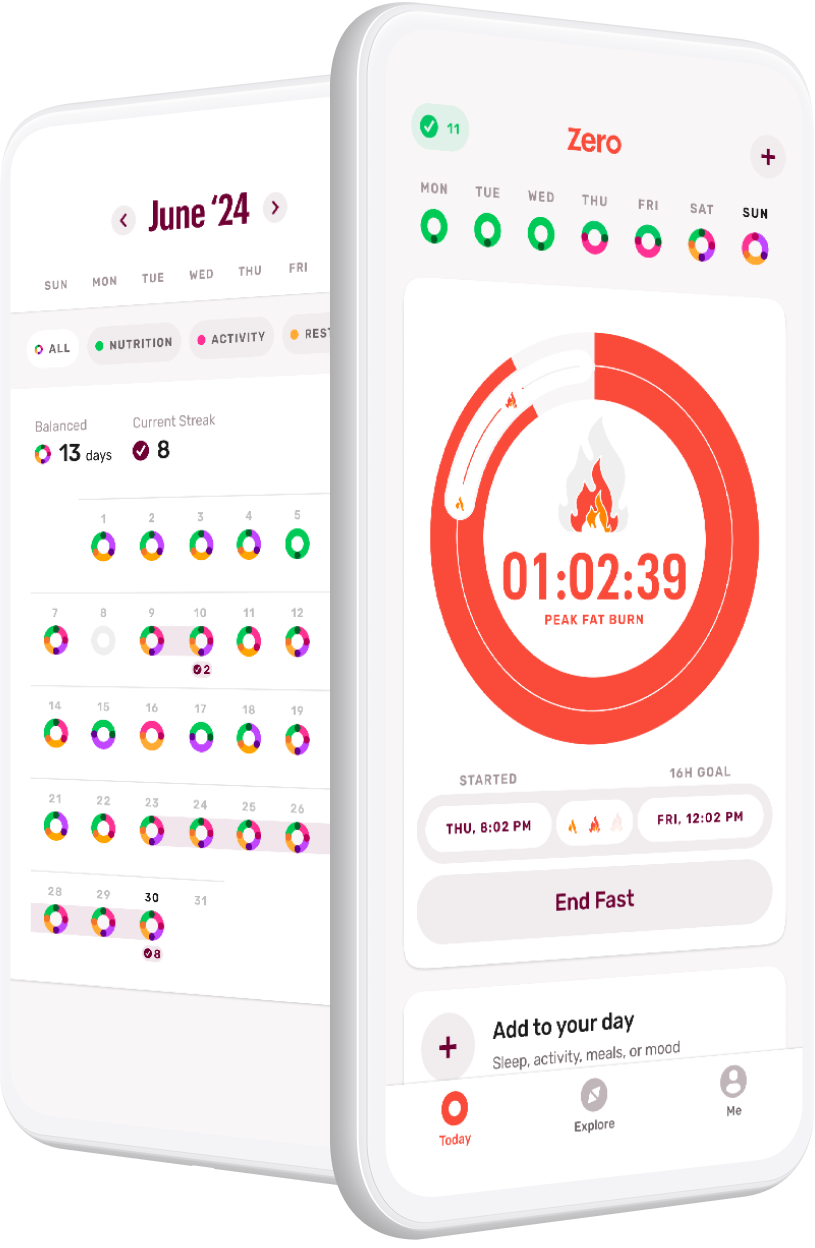Written and medically reviewed by Rich LaFountain, PhD
Intermittent fasting (IF) is a powerful tool for metabolic health. There are many options in the world of IF, but which option is best for you? If you’re trying to choose between a 12:12 or a 16:8 fast, this article is for you.
What Is 12:12 and 16:8 Intermittent Fasting?
Fasting involves abstaining from all calories in food or drink for a given period of time. The New England Journal of Medicine published a review of intermittent-fasting effects on health, aging, and disease, which summarizes the research into the benefits of different fasting lengths. Let’s get into the major differences between fasting for 12 hours and 16 hours.
What Happens in Your Body When You Fast for 12 Hours vs. 16 Hours
From an energy standpoint, when you fast for at least 12 hours, your blood-sugar levels decrease to baseline levels. This change turns on fat-burning machinery in your cells so that you can meet your energy needs. In most cases, fasting for at least 12 hours turns on some specific, fasted-state biological functions in your body. Fasting for 16 hours extends these benefits. There are very few metabolic or biological processes that work like on/off switches; generally, they are more like dimmer switches. Most of the key differences between 12-hour and 16-hour fasts are the result of allowing more time for fasting processes throughout the body to truly get going.
Key Differences Between a 12-Hour Fast and a 16-Hour Fast
While the 12 and 16-hour fast have many important similarities, the research suggests that there are differences between the two to consider, especially when first starting out.
Fasting Duration
The first, and most obvious, difference between the 12-hour and the 16-hour fast is the duration. The 16-hour fast is 4 hours longer and can be slightly more difficult to complete than a 12-hour fast. Many people naturally follow a 12-hour fast since they are asleep for 8 of those hours, which makes this approach seem less restrictive. Fasts greater than 12 hours in length are not advised for people under the age of 18, pregnant, breastfeeding, or anyone with a history of an eating disorder.
Autophagy
Autophagy is probably one of the best examples of a biological dimmer switch. Autophagy is a process in which your cells break down and recycle used or worn out materials. The process kicks off when energy levels are low so the body actually benefits from cellular cleanup, in addition to being able to conserve and/or create energy through autophagy. Signals for autophagy can be measured in under 24 hours in humans, but predictive modeling suggests that the fasting autophagy dimmer switch is not at peak “brightness” until 36–72 hours into your fast. Most of our understanding of fasting autophagy has been translated from animal studies.
However, there are a couple notable human studies that demonstrate fasting between 17 and 19 hours turns on genes that we know initiate autophagy. One study suggests that fasting for 18 hours activates autophagy, while another recent trial demonstrated that fasting anywhere between 17 and 19 hours throughout the month of Ramadan turned on autophagy signals. Based on these studies we can infer that fasting for 16 hours will bring you closer to realizing autophagy benefits than fasting for 12 hours.
Weight Loss
Both 12-hour fasting and 16-hour fasting can be effective for weight loss, but 16-hour fasting may be more effective because it may lead to a greater reduction in overall caloric intake (through a more condensed eating window) and promote more significant reliance on fat burning. A crossover study in healthy individuals demonstrated that a 16:8 fast was superior to a 12:12 fast in promoting fat loss.
Although data suggest longer fasts are associated with greater weight loss, it is important to keep in mind that if eating windows are too restrictive, you may undernourish in ways that slow your metabolism down. Even if you opt to do 16 hour fasts for weight-loss benefits, consider varying your fast duration periodically and making sure that you exercise and eat enough food to keep your basal metabolic rate from becoming depressed.
Fat Burning
Fasting for either 12 hours or 16 hours can promote fat burning. During a fast, the body depletes its stored glycogen and begins to rely on stored fat for energy. While both 12-hour and 16-hour fasting can promote fat burning, it’s possible that a 16-hour fast may be more effective. This is because the longer fasting period may lead to a greater depletion of glycogen stores, which can trigger higher levels of fat burning. If you want to burn more fat, the research shows that it’s important that you give your body more time to shift your metabolism towards prioritizing fat as a primary fuel source with fasts that are greater than 12 hours. Moderate exercise during your fast is another great way to burn more stored fat.
Hormonal Impact
Fasting can have a significant impact on hormone levels, but the specific effects may vary depending on the duration of the fast and individual factors such as age, sex, and health status. During a fast, the body goes through a series of hormonal changes as it adjusts to restricted food intake. For example, levels of insulin decrease during your fast, which can improve insulin sensitivity and reduce the risk of type 2 diabetes.
Additionally, fasting can increase levels of growth hormone, which is involved in muscle growth, tissue repair, and fat burning. The hormonal impact of fasting is linked with fast duration. Research shows that fasting for 12 hours yields less metabolic health and hormone benefits than fasting for more than 12 hours, so if your goal is to impact hormone levels, then you’ll probably want to consider fasting for 16 hours or more.
If you menstruate or are menopausal, it’s important to consider your hormones across your cycle as sex hormones are linked with metabolic function. Varying your fasts based upon natural fluctuations in estrogen, progesterone, and testosterone is important. For most women, this means that you can fast for longer durations in the first half of the month and reduce fast duration or avoid fasting in the last week of your cycle.
So, Is It Better to Fast for 12 Hours or 16 Hours?
When deciding on the best fast for you, it’s important to consider your individual goals and lifestyle. If weight loss is a primary goal, a 16-hour fast may be more effective. However, if you’re looking for a more sustainable fasting routine, a 12-hour fast may be a better fit. Ultimately, the best fast duration for you is the one that meets your needs and is something you can achieve. If you want to start with a 12 hour fast because you’re new to fasting, that’s still a great option. You can always work your way up to longer fasts, and you can vary your fasts based upon the dynamics of your life.
Can You Do 12 or 16-Hour Intermittent Fasting Every Day?
Many people have a daily fasting practice. They may not always follow the exact same fasting protocol, or they may vary the duration based upon their schedule, hunger, and exercise needs. Many people follow some variation of a 5:2 protocol in which they might fast for 16 hours during the week but relax their fasting practice to 12 hours on weekends or vice versa. The average person that does not fast consumes calories across nearly 15 hours of their 24-hour day. With that many hours of eating, it can be easy to over consume. While you don’t need to fast every day, fasting at least 12 hours occasionally will help you maintain a healthy body weight and metabolic health in the long term.
Should You Switch Between Intermittent Fasting for 12 Hours and 16 Hours?
One potential benefit of alternating between 12-hour and 16-hour fasts is that it can provide variety and flexibility in a fasting regimen. This can make it easier to sustain a fasting routine over time, which may lead to greater adherence and better overall health outcomes. Additionally, alternating between 12-hour and 16-hour fasts may provide some of the benefits of both fasting periods. For example, a 12-hour fast is considered easier and provides you with more schedule flexibility, while a 16-hour fast promotes greater fat-burning and metabolic benefits.
Conclusion
Whether you opt for a 12-hour fast or a 16-hour fast is less important than the overarching principle of developing a fasting practice that supports your long-term healthy lifestyle. Humans are not well-adapted to a diet of eating throughout their 24-hour day. Regular fasts lasting 12 hours or more can be an important part of your personal strategy to maintain health and maximize your longevity potential.
Ready to start using Zero? Take the quiz or download the app today.
- Debunking 3 Myths Around Fasting and Thyroid Health - April 15, 2024
- Breaking Down Fast Breakers: How to Tell If Something Will Break Your Fast - March 4, 2024
- GLP-1s and Weight-Loss Medications vs. Lifestyle Interventions: What’s Right for You - February 5, 2024


